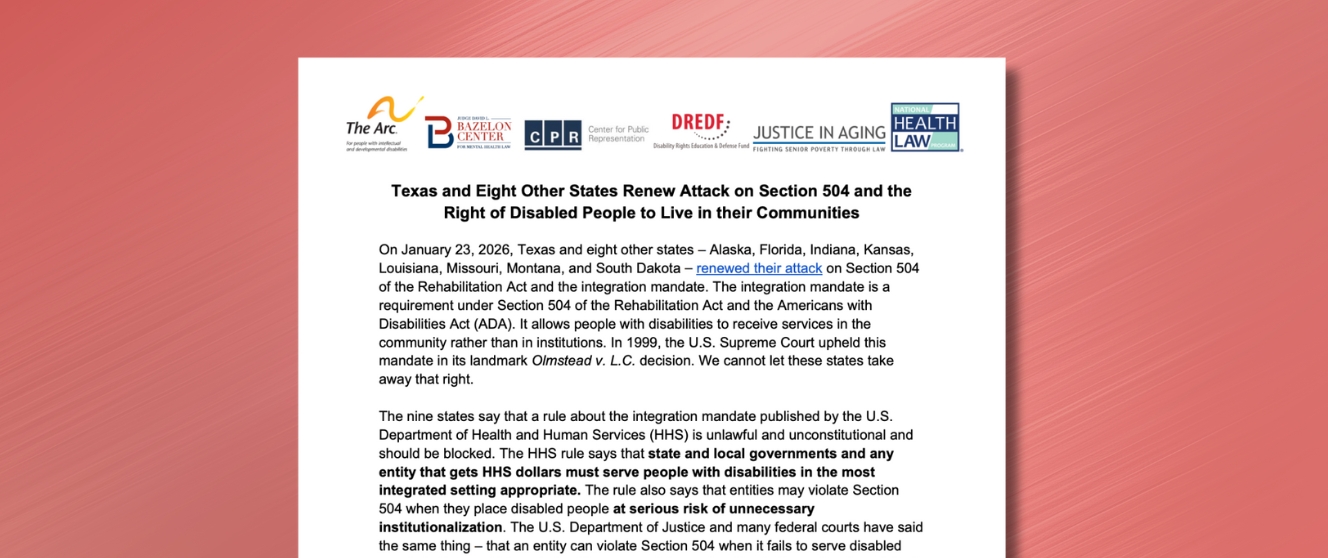
FOR IMMEDIATE RELEASE:
January 17, 2024
CONTACTS:
Brooke Weitzman, ELDR Center Executive Director, bweitzman@eldrcenter.org
Tina Pinedo, DREDF Communications Director, media@dredf.org
STANTON, CA – On January 8, 2024, the Disability Rights Education and Defense Fund (DREDF) and the Elder Law and Disability Rights Center (ELDR Center) filed a complaint against housing providers Aperto Property Management, Inc., Park Stanton Place, LP, and the Foundation for Affordable Housing II, Inc. (collectively, Park Stanton) for their failure to accommodate a prospective tenant with disabilities, leaving her unhoused.
Plaintiff Linda Harding is an individual with multiple disabilities who was without housing on and off for approximately seventeen years. In January 2022, Harding was approved to rent a unit at Park Stanton Place, a low-income housing tax credit property for seniors located in Stanton, California. Shortly before her move in date, and before execution of her lease, Harding contracted COVID-19, which exacerbated her disabilities and resulted in her hospitalization. Harding asked Park Stanton to let her execute her lease virtually or to delay the lease signing as an accommodation for her disabilities. Park Stanton denied her request, insisting that the lease had to be signed in person.
Rather than working with Harding to come up with a solution that would’ve allowed her to keep the unit, for which she had been approved, Park Stanton put the unit back on the market and rented it to another person. Harding was not able to secure another unit until months later, and the unit she eventually secured was more expensive and less able to meet her disability-related needs.
The complaint asserts that Park Stanton violated Harding’s rights under state and federal fair housing laws by failing to accommodate her disabilities and to engage in an “interactive process” regarding her disability-related needs.
“I’ve been homeless for close to 17 years and have gone through so much loss,” said Harding. “When I was sick and the people at Park Stanton would not work with me to get my lease signed and gave away my housing instead, it felt like I was losing everything again. It was devastating for me. I don’t understand why a housing company would treat people with disabilities like this.”
“Disability discrimination in housing remains widespread in the State of California,” said Michelle Uzeta, Deputy Legal Director at DREDF. “It is no surprise that people with disabilities are disproportionately represented among the unhoused.”
Brooke Weitzman, Executive Director at ELDR Center added “Accountability for landlords is the only way to stop the discrimination. We work closely with unhoused communities to remove barriers to housing only to have it taken from them at the last minute because the landlords do not think they need to accommodate people with disabilities.”
The complaint, filed in the United States District Court for the Central District of California (Harding v. Aperto Property Management et al., Case 8:24-cv-00040-PA-DFM), alleges violations of the Fair Housing Amendments Act and Fair Employment and Housing Act, among other claims. It seeks policy changes, fair housing training, and monetary damages. Read the full complaint here.
###
Disability Rights Education and Defense Fund, founded in 1979, is a leading national civil rights law and policy center directed by individuals with disabilities and parents who have children with disabilities. DREDF’s mission is to advance the civil and human rights of people with disabilities through legal advocacy, training, education and public policy and legislative development. For more information, visit dredf.org.
Elder Law and Disability Rights Center founded in 2017, is a leading local civil rights firm serving people with disabilities, older adults, and unhoused communities. In its first few years ELDR successfully obtained landmark federal injunctions changing the landscape of services in Orange County and beyond and endling the local criminalization of homelessness. ELDR’s mission is to ensure our community can live with dignity and independence through advocacy, education, and provision of legal services. For more information, visit eldrcenter.org.

